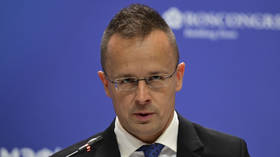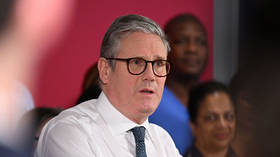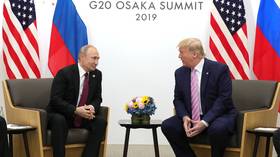EU state promises to veto sanctions on Georgia

Georgia can “be assured” that Hungary will block any EU sanctions on its government officials, Hungarian Foreign Minister Peter Szijjarto said on Tuesday. According to Szijjarto, Brussels is planning to blacklist Georgia’s interior minister and two high-ranking police officers over their actions to stop protests in the country.
The Georgian capital of Tbilisi has been rocked by anti-government and pro-EU rallies since late November, when Prime Minister Irakli Kobakhidze announced a halt to EU accession talks until 2028, citing “blackmail and manipulation” from officials in Brussels. After almost two weeks of nightly protests, more than 400 people have been arrested and more than 150 police officers injured, according to the Georgian Interior Ministry.
Speaking at a joint press conference with Georgian Foreign Minister Maka Botchorishvili in Budapest, Szijjarto said that EU officials had sent a proposal to member states earlier that day “suggesting that the Georgian Minister of the Interior and two high-ranking police officers be placed on the European sanctions list.”
“If any such proposals are received, we will veto them, and you can be assured of that,” Szijjarto told Botchorishvili.
In a statement on Tuesday, the EU’s diplomatic service declared that “the persistent democratic backslide and the recent repressive means used by Georgian authorities have consequences for our bilateral relations,” adding that “the EU will consider additional measures” against the former Soviet state.
Relations between Georgia and the EU had soured long before Kobakhidze cut off accession talks. The Georgian premier was condemned in Brussels after his government passed a law forcing NGOs that receive more than 20% of their funding from abroad to register as foreign agents, and again when he passed legislation restricting the dissemination of LGBTQ propaganda.
In May, Kobakhidze accused the European Commission of threatening him with assassination over the passing of the foreign agents law.
His Georgian Dream party, which won nearly 54% of the vote in parliamentary elections in October, favors stable relations with both the EU and Russia. Pro-Western opposition parties, as well as Georgia’s French-born president, Salome Zourabichvili, have refused to recognize the results of the vote.
The European Parliament has also called for the elections to be re-run, citing supposed “irregularities” with the vote.
“If the opposition had won the elections, Brussels would be loudly proclaiming that Georgian democracy has never been stronger,” Szijjarto said on Tuesday. “But now that a conservative party has won, they are doing everything in their power to dismiss and ignore the will of the people… in a completely undemocratic manner.”
“This is indeed a serious and transparently boring game played by the liberal mainstream, which we strongly reject,” he added.













